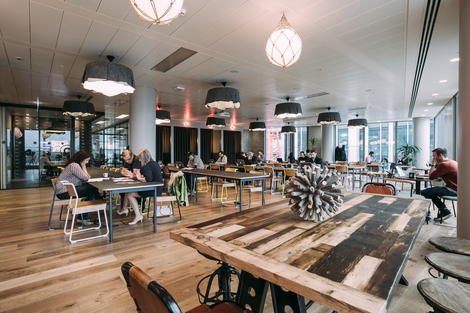A new survey confirms that 78 per cent of consumers judge a company on the quality of its premises or location to some degree.
The same study, commissioned by business address provider, ava, revealed that more than half of UK workers feel uninspired by their current working environment, which suggests that an accessible, well-located HQ with a strong technological infrastructure can attract customers and boost employee morale and productivity.
Choosing the right location makes business sense.
According to ava’s Lucie Greenwood, business owners need to curb the tendency to cut corners when it comes to office space. “As our findings show, consumers and employees still put a lot of store in an organisation’s location. The money that you save on your rent could well be offset by the reputational damage that you suffer because you’ve chosen one town over another,” she explains.
With the rise of colocated workspaces, cloud technology and a slew of communications platforms, you may even consider if you need a full-fledged office at all.
A token office that serves as a meeting place, or a mailing address-cum-switchboard phone reception may suffice, but as this study reveals, having a physical address in a prime location influences the way your business is perceived.
Here’s a checklist for choosing your HQ.
Are you near competition?
Base your base on what you do. For example, a digital agency may benefit from having its offices in Shoreditch. Just as Old Street is known for its tech start-ups, and Canary Wharf for its financial advisory firms, Shoreditch is well known for its creatives.
By setting up your HQ in a hub, chances for networking and collaboration may crop up. It also helps cement credibility with clients.
1. Are you accessible?
Office space in London, for example, is notoriously expensive, but prime location doesn’t necessarily have to be in Mayfair or London Bridge.
If you do your research, you may find neighbouring boroughs on the up that could be the next big commercial district. For example, a lot of regenerated areas that are soon to be on the high speed rail network could become prime property in the next decade.
‘Saving’ money on cheaper out-of-the-way office space could cost your business in the long run, so prioritise being accessible to clients.
A space near public transportation lines and car parks can be useful. Access to meeting rooms, or restaurants primed for business meetings could be another consideration.
Setting up your HQ in an area known for its shops, restaurants, cafes and parks could do a lot for employee morale, and as a result, productivity.
3. Is your location connected?
Most businesses are Internet businesses in some capacity. Consider your location based on the strength of your broadband connection as well.
A weak connection could seriously impact your productivity and ultimately that could cost you in terms of lost time and lost business in the long run.
4. Have you considered an estate agent?
There are many hidden costs when renting or buying commercial space, including maintenance and management fees or parking costs.
If you foresee any hiccups in paying a three-month rent deposit upfront, bide your time for when you can.
Enlisting an agent could help you stay in budget and streamline all the planning and logistics when you move.
Of course, this could be yet another cost, so budget carefully.
5. Are you scalable?
An office too small may be stifling and uncomfortable, while a large office space may be a waste of rent.
As a general rule of thumb, consider a space that offers 80 to 100 square feet per person.
At the same time, you may need to plan for the future. Do you plan to scale up in the next 12 months? Do you expect any lay-offs? Factor these in when renting your office space.
6. Have you thought about building management and maintenance?
Know your building managers before you move in. This person is your go-to contact if you should need any repair work done.
Make sure that the lifts, windows, heating, ventilation and air conditioning are in working order.
Before moving in, meet and get to know your janitorial staff well. The cleanliness of your office depends on them, so establishing a good relationship early on may help.
7. Have you considered shared offices?
Shared working spaces have been cropping up all over the country, with Wework,Regus, Office Space in Town cornering the market.
These spaces take care of multiple expenses in one shot – office space rental, broadband and phone connections, meeting space rentals, food and beverages, office maintenance and cleaning – all in central locations.
While renting shared space may be high, it’s an all-encompassing fee that takes care of logistics and admin, freeing you up to focus on growing your business.
It also affords networking and business opportunities. Your neighbour just might be your next client.
8. Have you read through your lease?
Protecting yourself against any legal issues by familiarising yourself with the lease.
For example, what if you want to sell the company during your lease? Are you comfortable with the tenancy period? Is there a rent hike clause? For how long can you legally rent the space?
These are some of the more important considerations when you set up your headquarters. Ultimately, its your decision on what matters most to your business.
If you’re largely based online, an office space may not be your priority, but it’s most likely still an anchor for clients and employees.












